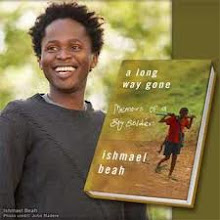(Blogger, Author and Book Reviewer)
04/02/07
A Long Way Gone
My high school friends have begun to suspect I haven’t told them the full story of my life.”Why did you leave Sierra Leone?”“Because there is a war.”“Did you witness some of the fighting?”“Everyone in the country did.”“You mean, you saw people running around with guns and shooting each other?”“Yes, all the time.”“Cool.”I smile a little.”You should tell us about it sometime.”“Yes, sometime.”In this book, that has spent a couple of months near the top of the New York Times list of bestsellers, Ishmael Beah tells about it. When he was only twelve, with his country of Sierra Leone thrown into a long and bloody civil war, his village was attacked by rebels. He was forced to run for his life knowing that if he was caught he would be forced, upon pain of death, to join the rebel army. For months he and his friends ran, successfully evading the rebels as they systematically destroyed the nation, raping, pillaging and murdering indiscriminately.
Eventually Beah found himself in a village controlled by the national army. He thought he was safe here, but they soon compelled him to fight for them, despite his young age. Fueled by hatred towards those who had harmed his family and driven him from his home, he readily joined the cause. For over two years he fought for this army, participating in countless battles and skirmishes. He became a cold-blooded killer, killing, torturing and maiming. He was supplied with endless amounts of marijuana and cocaine and lived these years in a constant drug-induced haze. Though he began fighting on what he felt was the good side, he soon found himself descending further and further into moral decay so that he felt nothing, even when he looked into the eyes of men whose throats he was cutting.
The book takes a somewhat unexpected turn when Beah is suddenly handed over to UNICEF for rehabilitation. In one day he goes from being a soldier in the forests of Sierra Leone and the next he is taken to a rehabilitation center in Freetown. He slowly and painfully recovers from his drug addiction and is reintegrated into society. Though he was “a long way gone,” he is able to recover his humanity, though only with much time and patience. The story comes to an ending that is disappointing for its abruptness and leaves the reader with many unanswered questions.
It is a moving story and a terrifying one for it plainly displays the senseless depravity of human beings and the depths we can fall to. It shows how even a nice young man can be so easily reduced to a killer. While Beah was blessed to be able to eventually escape the controls of the military and to escape to the United States, some 300,000 child soldiers remain in combat around the world.
There were at least two aspects of this book that gave me much to ponder. The first dealt with moral culpability in situations like Beah’s. How much responsibility does a person like this bear for his actions? He was just a young boy when he was forced into drug addiction and, while under the influence of narcotics, to commit horrifying atrocities. Does he bear the same responsibility as if he had done all this as an adult who was not under the influence of narcotics and under the influence of bloodthirsty leaders? The second aspect, related to this, dealt with Beah’s recovery. When he was in the rehabilitation center he would be told constantly, “It’s not your fault.” Yet this answer infuriated him so that he would plug his ears rather than having to hear it again. It seems that he somehow wanted to be able to take responsibility for his actions but that the people who rehabilitated him would not hear of this. The book does not go into as much detail as I would have liked about his psychological or spiritual recovery. The cover mentions that he had to learn how to forgive himself, but this does not seem to factor into the narrative. What I hope for this young author (who is still only twenty six) is that he will be able to assume responsibility for his sinful actions and seek true forgiveness from the One who is both willing and able to provide it. This will surely mark his deepest and most important recovery. Only in the Bible will he find a clear explanation as to how he could be so easily swayed by sin and only in the Bible will he find the hope of forgiveness.
A Long Way Gone is an important book and one that is well worth reading. It shakes the foundations of those of us who live in a part of the world that is so safe and where we are so sheltered. It inspires gratitude that we have escaped such pain and hopefully inspires action that peace may come to nations where young boys are still drafted into service as ruthless, cold-hearted killers.
